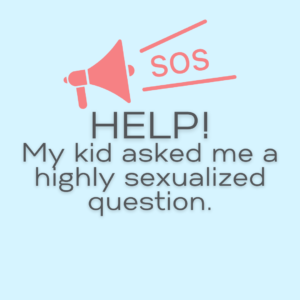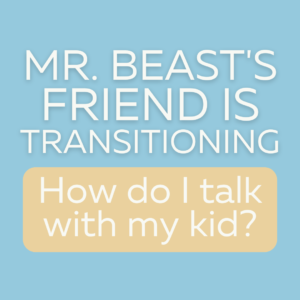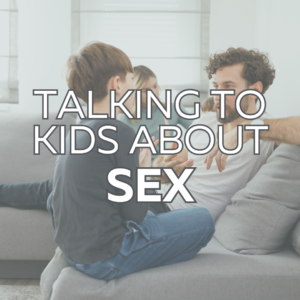0:00:03 – Speaker 1
Hey, this is Mandy and Kim with nextTalk, where we are passionate about keeping kids safe in the digital world.
0:00:09 – Speaker 2
Did you know? we have tens of thousands of listeners in 60 countries. It’s truly amazing, crazy. Only God And, as a non-profit, everything we do at nextTalk is supported by people just like you.
0:00:21 – Speaker 1
Be a part of changing the culture of conversation in your home and around the globe by making a donation today.
0:00:28 – Speaker 2
Go to NextTalkorg and click on Give.
0:00:30 – Speaker 1
And check out our resources while you’re there. More than cyber parenting conversations to connect. This is a big show today, important show, serious show. We have worked with a lot of families and with our counselors that serve in our advisory council to create the contents of this show Lots of prayer over these topics And we have learned a lot as we’ve walked through this the last several years with different stories and families that come to nextTalk for help One thing we want to note is that sexuality and transgender are two very different topics.
Yeah, you know, in my book Talk my original book, my first book I have two separate chapters on this and really dive into it in more detail and depth And then we’re going to be able to get into it today. But as I’ve researched this for my books and just walked with other families through this and talked with tons of counselors, you know God started putting together this process And this is kind of like a general overview of what to do when your child is questioning big things like their sexuality or their gender.
0:01:40 – Speaker 2
I still remember getting that email from you where you said God’s really showing me four steps that every parent needs to do. Let’s start with number one Love your kid no matter what. Meet them right where they’re at. And I love this one because it really is the core of what we do here at nextTalk and that’s default to love, And there shouldn’t be any like throwing the kid out or disowning your child, The things that we hear about all the time, those stories. The first thing we have to do is just literally love them where they are.
0:02:11 – Speaker 1
You know, a phrase that I use in my house all the time is I love you the same and give them a hug. Right, i love you the same. You know, we need to love our kids right where they are. And this step, right here, i will tell you this number one step. It applies to anything and everything. If your kid is watching porn, if your kid shared a nude photo, like whatever, it is this number one thing. We have to get this right And if we do misstep, apologize. You know we still have to talk about what happened, but I’m sorry I responded that way. I love you, no matter what. Kids need to know that. And what I want to say about this step number one, this is going to continue throughout all the other steps, like we never stop loving our kid, right?
So, even though it’s that first initial response, this carries through throughout the other steps.
0:02:58 – Speaker 2
Well, and I think something to keep in mind that will help you understand why this step is so important again for any scenario is that it’s never worth ruining the relationship with your kid, no matter what they’ve done, no matter what they’re questioning, no matter what’s going on. You want to be able to walk them through that, and if you don’t love them right where they’re at, then you risk losing the relationship, and that’s not worth it. Nobody wants that, and so this step is so important And, like you said, it’s got to carry through the whole process.
0:03:27 – Speaker 1
Now, as we go into steps two and three, i want you to hear me here. These aren’t four steps that you’re going to do, probably in a night. So steps two and three could take years. They could take months. Okay, this is not something that’s a one and done. This is launching into a journey with your kid. So when we share steps two and three, i don’t want you to think, okay, i can get through this in just a couple of conversations. This is a process. So steps two is this ask the why behind the revelation. Again, this can take weeks or months to figure out. You’re looking for things like when did you start feeling this way and why?
In this step, listening is critical. You are trying to gather information. So as much as they tell you, try and just figure out context, look for clues, what we want to be careful of too. Sometimes kids hear a story on the internet and they just verbatim repeat it. So if it doesn’t sound like you’re kid and it’s coming out of nowhere and you had no indication, like, have your guard up. They could have heard a story online and they’re just verbatim repeating it. Like this is how I feel.
So, this is why it’s so important to like dig, i mean, and this is why I say it can take months And when you say dig, i think it’s really important to clarify.
0:04:51 – Speaker 2
We don’t mean push Like we. you don’t want to get in there and just nail them with question after question. You are not a lawyer. This is not a courtroom. You are their mom and their dad and you are loving them through a conversation about you know where did this thought come from? Did you see something like gentle questions that come naturally over time? Oh, i’m so glad you said that, kim.
0:05:14 – Speaker 1
You know this is when I say this, i picture a mom crawling in bed with her kid scratching their back at night. And just one question, you know like well, tell me exactly what you’re thinking here. You know, and you’re just trying to gather information. This step right here. It hit me like a ton of bricks because I walked a family through this And you know I said love your kid, love your kid. And you know, dig into these conversations a little bit at a time.
And months and months went by and I was praying for this mama and I would contact her and check on them, see how they were doing. That child was seeing a counselor, medical professionals were involved. All of that was already happening, which was absolutely wonderful. I was just coming alongside as a prayer partner and whatever. And this mama messaged me one day and she said you’re never going to believe what came out. At like 2 am when we were just laying there chatting, this child came out as lesbian. You know, months and months later of conversations, of trying to figure out the why, what came out was this mom. I’ve been watching pornography. When I see boy on girl porn, the boy always hurts the girl. She’s always getting hurt. Why would I ever want that? But when I see girl on girl porn, it’s gentle, and that’s what I mean I want gentle. Had she not dug into the why, she never would have discovered that her child was watching pornography And then it was skewing her vision of what a real boy-girl relationship looks like.
0:06:44 – Speaker 2
Asking the why can reveal all kinds of things, and that’s why this step is so important. You know, in Mandy’s example with this mom, it revealed pornography, but it could be sexual abuse. It could be exposure or manipulation through social media Who knows? And that’s why it’s so important to take the time, like Mandy said before, to talk through this over time. Give your kid a chance to open up And I love that you painted the picture, you know, of crawling into bed with them to talk about it, because I think sometimes it’s so hard to have these conversations with your kid And inside you’re hurting so much And hearing their answers is difficult. So that’s a great way, you know, rubbing their back when they’re telling you these things, so they won’t see the look of shock or anger or just not understanding where they’re coming from. Find a place and a time and a space where you can gently ask the questions and where you can receive their answers.
0:07:38 – Speaker 1
Well, and the other thing on this is there’s a culture out there that is telling parents, when kids question these big things, that parents are supposed to do automatic accept and affirm. Hear me, this is dangerous. If we’re not allowed to ask the question why? and really dive into these conversations, then sometimes we miss the underlying issue, like pornography or sexual abuse or manipulation of a story that they’ve seen on social media and they’ve just adopted it as their own. So we have to be able to ask the questions, but we have to do it in a place of love, not of shame or judgment.
0:08:20 – Speaker 2
When we were preparing for this show. I remember you came across this article and you shared the information with me and it was just really eye-opening. It’s from the Canadian Gender Report. We did what the experts told us And here’s a quote from that article. An amazing therapist I have worked with over the years says be mindful of trying to get your child to change or stop a behavior before you understand what is underlying it. That is powerful, but none of the healthcare professionals went at it that way. We have been massively let down by the healthcare system in Canada. As the mom of a child who has suffered for years, we are lucky Dia is still alive. Many are not so lucky. Wow.
0:09:04 – Speaker 1
I mean, that’s from a family who’s walked through this. This is not just happening in Canada. This is happening everywhere, because the online world is reaching our kids all over the world and they’re hearing these stories and this culture of accept and affirm. And parents are hearing it and then they’re afraid to ask the questions, and I’ve talked to a lot of counselors about this and they are like we always have to ask the why. So, as parents, let the counselor ask the question, but let’s us dig into it too. While we’re crawling in bed with our kids at night and scratching their back, we have to get to know and understand and sympathize about why our kids have these questions.
0:09:46 – Speaker 2
Okay. So step one love your kid no matter what. Step two ask the why behind the revelation. And now onto step three talk about your beliefs. And this is a step where some parents disagree on how to handle it.
0:10:00 – Speaker 1
Yeah, so we’re Christians. Kim and I are Christians. Our team are Christians. This conversation may look different in different homes of different faiths or beliefs. We always say your family, your choice. Like you, get to decide where to take your kid from.
Here We are speaking from a point where our faith is important to us, and so we’re going to speak from that perspective, and let me tell you one of the things as I’ve worked with a lot of different counselors from different beliefs is counselors can take your kids in a different direction. In this step, all the counselors that I’ve talked to, regardless of their beliefs, they are always like love your kid, ask the why, because we do have to figure out some underlying things, but here I see a lot of counselors going in different directions. So if your kid is struggling and you are getting a counselor to help, i encourage you to ask the counselor where are you going to take my kid? What are your beliefs about this? You need to know that you’re paying for an adult to go behind a closed door with your kid and influence your kid’s thoughts and beliefs, and so it’s an important question, and I never actually would have thought about that.
This is a counselor that I work with closely painted this picture for me. She was like this is an adult with a child behind a closed door. It is a big responsibility And a lot of parents we just see, oh, they have a degree in counseling, they’re a Christian counselor, they must be fine. But there’s a lot of different beliefs even among Christian counselors. So you kind of need to do your research here on where the counselor is going to take your kid and where you want your kid to be taken.
0:11:39 – Speaker 2
Well, and I’ll be honest, that’s a great point, but really, whether you’re Christian or not, that question needs to be asked. You know, if you are having your child influenced by an adult, you need to know what it is they’re going to say. So very important step when you’re getting professional counseling. You know, for us and our Christian faith, when we get to this step three, it’s important for us to turn to scripture for truth. This is kind of where we go back to our basic values, our core beliefs, and we talk to our kids about who we are and whose we are.
0:12:11 – Speaker 1
One of the counselors that we work with that serves on our advisory council and I trust a lot with when it comes to these type of issues. She reminds us all the time our identity is found in God alone. That’s our identity. It’s not in our sexuality, it’s not in our gender, because those things can become an idol where nothing else matters other than that, and so our identity is found in Jesus. We submit to God and then we get answers from His scripture on how we live.
0:12:43 – Speaker 2
I want to make the point right here. You know I have younger kids and I have notice and I’ve walked through this with you and other moms that as kids get older it’s really hard if you just start quoting scripture to them and sending them to the Bible if you haven’t started that with them when they’re younger. If you can lay that foundation with establishing marriages between a man and a woman and this is what God says about marriage then it’s already foundationally a truth for them Before they start feeling anything because of hormones and sexuality and all of that that starts happening at a later age. if they already know what truth is, then it’s a lot easier to have that discussion with them when they’re older than if you’re trying to start that conversation when they’re 15. 100%.
0:13:29 – Speaker 1
If you’ve never sent your kids to scripture for anything, if you’ve never said you know what does God say about this? And then all of a sudden they’re questioning and you’re trying to send them to scripture. They’re like rolling their eyes at you, like what, yeah, where is this coming from? And so that’s why, Kim, i’m so glad you brought this up. It’s such an important thing to do. When they’re little, they need the foundation built before feelings are entered into the picture.
For you Christian families out there, a couple of verses that are really good for the sexuality 1 Corinthians, 7, 2, and 3. Romans 1, 25 to 27. Those are like my go-to summary scriptures. There’s lots more in the Old Testament and the New Testament. I share all of them in my books but just for the sake of time and for you being able to jot them down, transgender verses Genesis 2, 22 to 24, matthew 19, 4 to 6, and Matthew 19, 12. These are scriptures. As soon as your kids can read, you can send them to the Bible and then you can say hey, what do you think God says about you know, are we born male and female and who are we supposed to marry? Start that dialogue super early in your home A couple other resources for you that I have found incredibly helpful for conversations for other families and in my own family as we’re navigating through these topics that are front and center in our kids world today.
Sexuality There’s a great book called Gay Girl Good God, by Jackie Hill Perry. This is a Christian based biblical book. It’s solid. Listen to it. She’s got some podcasts that she does with her husband. It’s great. The other one is a transgender book just came out. It’s called Irreversible Damage The Transgender Craze Seducing Our Daughters, by Abigail Schreyer. Now I do want this to come with a disclaimer. This is not a faith based or a Christian book. The author went out and she interviewed doctors, parents, trans kids, detransitioners, and she’s compiled all that data for you, and so it’s really great. It walks you through what drugs they take and what surgeries they have when they transition, and you get to hear also firsthand families that who have gone through this, and so it’s just very insightful. I think every parent, youth pastor, coach, teacher should read it just to get that perspective.
0:15:55 – Speaker 2
And also because these topics are so different sexuality and transgender another great resource would be to go back and listen to the two separate shows that we did on this. We go deeper into each of these topics and explain why they’re different and give you some information so that if you’re talking with your kids, you kind of have some background there that will help you with the conversation.
0:16:17 – Speaker 1
And, as we said before this step two and three this could take years. This could take years to unpack all of this. Okay, this is not going to be in one night, but as we’re looking at this process, step four is this teach your kid to love and respect others who believe differently. So, no matter how you are handling steps two and three, you are going to have people disagree with you. No matter how you’re handling it, somebody’s not going to like how you’re handling it in your family And there’s going to be opposition in people who don’t agree with how you’re handling it. So one of the things that we really need to do is talk to our kids about that And say your friends at school may feel differently than we do. That’s okay. Our job is to not bully, not disrespect, not be mean. Be an example of like Christ was. He loved everyone.
0:17:10 – Speaker 2
And this is a lot easier said than done, because I think a lot of times behind closed doors, when we’re comfortable and when we’re with our family, sometimes we can make comments about things we see on TV or we can say things in passing and we’re just joking as adults. But our kids take that seriously sometimes and they take that in and they process that as judgment.
0:17:31 – Speaker 1
That’s a great point, kim, and one of the things that we have done is draw lines on certain words we don’t use. One time my daughter came home and said so and so said God hates F-A-G at the lunch table And that was a very teachable moment for us. We were like we never use that word. First of all, god doesn’t hate anyone. God wants everyone to come to him and change their life and be transformed by him. God wants that for each and every person, but we don’t use that word ever because it’s derogatory. So set those boundaries when you have those teachable moments. That’s important for your kids to see. And also it’s important for your kids to see you love people who are different than you. It’s so cool with the adults in my life that I’ve been blessed with. They know I may not have the same beliefs as them, but they still come over to my house for dinner. They’re still our friends, we still love them And it’s good for your kids to see that.
0:18:28 – Speaker 2
Absolutely, and a great verse here is Matthew 7.12, treat people the same way you want them to treat you. I mean, i’m not sure it could get any more straightforward. God is calling us to be Jesus to people and to treat them in the same way that we want to be treated with love, respect, kindness, grace, and so that’s a great one to share with your kids at any age, and Christians.
0:18:49 – Speaker 1
our beliefs do not give us an excuse to be mean to people. They do not. Our beliefs, just in that scripture, point us to have this mutual respect for people.
0:18:59 – Speaker 2
That’s what Jesus preached, okay so back to the four steps that God really gave you, mandy, and I’m just excited that we get to share that with families And I am praying that it helps so many walk through this process. Number one love your kid no matter what. Meet them right where they’re at. Number two ask the why behind the revelation. Remember this can take weeks and months of conversation, but don’t back down. Get in there and talk with your kid. Number three talk about your beliefs, your family, your choice, but make sure your kids know what you believe. And number four teach your kid to love and respect others who believe differently.
0:19:42 – Speaker 1
As we wrap up this show. Parents, we know these are big topics, but what we don’t want you to do is shy away from them. The world is shouting loudly at your kids and they need to hear your guidance on this.
Transcribed by https://podium.page











